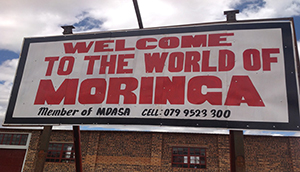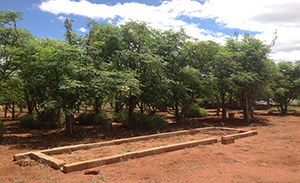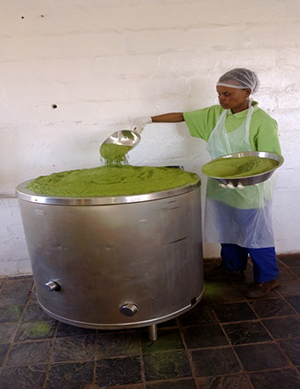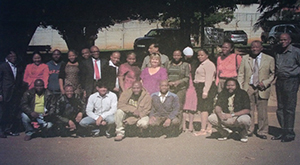

Interesting Links
-
INFORMATION ON LOCAL MORINGA ACTIVITIES, RESEARCH AND INDUSTRY:
During the past 15 years a lot of institutions, farmers, government departments and parastatals, individuals and research stations have shown an interest in Moringa. The following bears testimony of our statement.
Moringa Development Association of South Africa (MDASA)
MDASA was established in 2013 and is a non-political, non-sectarian, and non-profit making body devoted to the study, promotion and empowerment of all aspects of the Moringa tree such as growing, product development, marketing, protection, research, social, health and economic exploitation of Moringa and other related areas. MDASA Registration no: 2013/130440/08. MDASA web page:http: www.mdasa.org

MDASA launch event at the Patience Wellness Centre in Limpopo Province, South Africa
The objectives of the Association are:
To address socio-economic development issues through the use of Moringa (nutrition, medicinal, job creation, enterprise development).
To promote the use and production of Moringa in South Africa through collaboration, research and community training, farming, new product development and quality control, marketing, teaching and information sharing through workshops on any aspect of Moringa
To harmonizing knowledge and facts about Moringa
To disseminate information through Community workshops, advertising, newsletters
To train communities on various aspects of Moringa - from growing through product development to marketing.
MDASA furthermore aims:
To coordinate all activities of Moringa in the country
To act as link between Moringa growers, Moringa product developers and Moringa consumers with Government, government agencies and Private sector (stakeholders) in the country and
internationally.
To collaborate with professional organisations with similar aims
To protect the rights of Moringa growers, Moringa products, Moringa seed banks and organic growth principals for Moringa.
The country has an estimated 800 Moringa growers including large scale as well as small scale farmers. In addition Moringa is grown in numerous (>1000) household gardens.
MDASA secretariat contact details:
Mr Rene Munya, E-mail: renemunya@mdasa.org
Dr Riana Kleynhans, E-Mail: Rkleynhans5@gmail.com
ISHS Working Group Moringa
Universities
The South African Universities are no longer ivory towers that used to divorce themselves from the ordinary man in the street, but have become involved with various Community Outreach Programs. In these programs, research students with their professors visit some farms to look into the farmers operational methods and ask questions. Normally questions revolve around farming methods, productions systems, marketing strategies, nutritional and medicinal properties investigations, value addition processing etc. In some of these, researchers collect material such as the leaves, the roots, bark and flowers to carry out research activities and report their findings to the farmer. This close working relationship between the institutions and the farmers has helped a great deal in enhancing Good Agricultural Practices (GAP) and has increased the number of success stories. Moringa has become a center stage plant in all these activities. A number of scientific publications from these Universities can be found in local and international journals.
University of the Witwatersrand:
(Contact Person: Prof. Luke Chimuka, e-mail: luke.chimuka@wits.ac.za). Involved into profiling essential organic compounds in the Moringa plants growing in different parts of the country and those Moringa products (powder) sold on the South African market. Also involved in green extraction of Moringa and product formulation. [Recent publications: Pakade et al., 2013. Metal and flavonol contents of Moringa oleifera grown in South Africa. South African Journal of Science. 109 (3/4), Art 835; Matshediso et al., 2015. Analytical Methods: Development of pressurized hot water extraction (PHWE) for essential compounds from Moringa oleifera leaf extracts. Food Chemistry 172, 423-427].
University of Johannesburg:
(Contact Person Dr. Edwin Madala: email; emadala@uj.ac.za). Involved in profiling essential organic compounds in the Moringa plants and investigating how different environmental stresses affect Moringa chemical composition. [Recent publications: Khoza et al., 2014. The effect of temperature on pressurizes hot water extraction of pharmacologically impotant metabolites as analysed by UPLC-qTOF-MS and PCA. Evidence Based Complementary and Alternative Medicine. (http://dx.doi.org/ 10.1155/2014/914759)
University of North West (Mafikeng campus):
(Contact Person Prof. Simeon Materechera, email: albert.materechera@nwu.ac.za)
University of Pretoria:
(Contact Person: Prof. Elsa S. Du Toit email: elsa.dutoit@up.ac.za). Involved in various cultivation and quality control aspects related to the production of Moringa. Specific research linked to the use of Moringa as biofuel source. [Recent publications: Muhl et al., 2014. Irrigation amounts affect the compositional changes of Moringa oleifera seeds throughout different developmental stages. International Journal of Agriculture and Biology 16,201-206; Ratshilivha et al., 2015. The variation in antimicrobial and antioxidant activities of acetone leaf exracts of 12 Moringa oleifera trees enable the selection of trees with additional uses. South African Journal of Botany. 92,59-64.]
University of Limpopo:
(Contact person: Paulina M Mabapa, e-mail: paulina.mabapa@ul.ac.za) [Recent Publications: Rapatsa & Moyo, 2014. Effect of Moringa oleifera on the histology, haematology and growth of Oreochromis mossambicus in aquadams fertilized with chiken manure in South Africa. African Journal of Aquatic Science 39,295-303].
Tshwane University of Technology:
(Contact Person: Dr Riana Kleynhans: email: kleynhansR@tut.ac.za)
University of South Africa:
(Contact Person: Morota, K. email; morotkb@unisa.ac.za).
University of KwaZulu-Natal:
(Contact Person: Prof: Indres Moodley: email: moodleyi15@ukz.ac.za). Involved in the research that looks at possible application of Moringa herbal extracts as medicinal and nutritional supplement. Other researchers at the same institution is investigating anti-oxidant properties
[Recent publications include: Tiloke et al., 2013. The antiproliferative effect of Moringa oleifera crude aqueous leaf extract on cancerous human alveolar epithelial cells. BMC Complementary and Alternative Medicine 13, 226-234; Tesfay et al 2016. The effect of temperature in moringa seed phytochemical compounds and carbohydrate mobilization. South African Journal of Botany, 102,190-196.]
University of Fort Hare:
Researchers focus on animal feed supplemented with Moringa and its effect on meat quality [Qwele et al., 2013. Chemical composition, fatty acid content and antioxidant potential of meat from goats supplemented with moringa leaves, sunflower cake and hay. Meat Science 93,455-462; Mukumbo et al., 2014. Effect of Moringa oleifera leaf meal on finisher pig growth performance, meat quality, shelf life and fatty acid composition of pork. South African Journal of Animal Science 44, 388-400; Nkukwana et al., 2014. Fatty acid composition and oxidative stability of breast meat from broiler chickens supplemented with Moringa oleifera leaf meal over a period of refrigeration. Food Chemistry, 142, 255-261]
University of Stellenbosch:
[Recent publications: Ampofo-yeboah et al., 2013. Analysis of oleanolic acid and ursolic acid, potential antifertility agents in moringa seed. Journal of Agricultural Science and Technology A 3:989-999]
Other universities involved in Moringa research include:
University of Zululand; Vaal University of Technology; Walter Sisulu Metropolitan University; University of Western Cape.
National government departments
Department of Science and Technology (DST): This department has made available a substantial amount of capital in the past to support the moringa-oriented activities. Moringa is recognized as part of the indigenous plant because of many years of use in the country. The DST funds the Moringa consortium that consists of Moringa growers and researchers from the Universities. It has funded infrastructure for growing and preprocessing and processing of Moringa. It has also funded research aimed at value additions in the quality of Moringa and in Moringa product development. DST has also played a major role in the establishment of Moringa Development Association of South Africa (MDASA) along with Agriculture Research Council (ARC) and University of the Witwatersrand (Wits University). (Contact Person: Dr A. Grootboom: email: Andile.Grootboom@dst.gov.za).
Department of Agriculture: This department is not only interested in Moringa farming but has voted substantial financial outlay to support emerging farmers. The department has also developed a Powerful Community Outreach Programme on Moringa. For example, it has donated 400 one meter high moringa seedlings to the Stink water Community in North West.
Department of Rural development and Land Reform: The department has and is still encouraging many communities to look into moringa as an alternative solution to unemployment, Moringa has many industrial spin-offs.
Department of Education: The Department has not only seen it apt and appropriate to incorporate the study of Moringa Plant in their syllabus, but is encouraging schools to plant Moringa in their schoolyards. This strategy helps in showing the learners the physical tree.
The Department of Health: MDASA (Moringa Development Association of South Africa) went to the seat of Government in Cape town in 2013 to encourage the National Portfolio on Health to consider the use of Moringa as a way to improve the health of the nation, particularly in clinics. Negotiations are afoot with MCC (Medical Control Council) of finding each other in this matter. Unfortunately not much has been covered in this matter.
Department of Trade and Industry: The Department of Trade and Industry is interested in value additions in Moringa especially in product development for job creation locally and for exporting to international markets. It has supported some of the Moringa product developers to exhibit their products in countries such as Germany, Canada and Botswana.
Gauteng Department of Economic Growth and Development: This is a government department that funds The Innovation Hub. It also supports other job creation ventures including that of Moringa production.
Government parastatals and other organizations
These are institutions which are substantially funded directly by the National Department of Finance. Their basic function is to fund viable project that will bring changes on a national scale.
Agriculture Research Council (ARC): This agriculture oriented council has been very active in supporting activities that are geared towards the development of Moringa. Much of DST funded Moringa farms are implemented by ARC research team. This has helped these farms to produce quality Moringa dry powder that meets international standards. During the launch of MDASA in March 2014, ARC played a role in financing the activities of MDASA. The Council has not only funded MDASA during the launch, but is a permanent venue for all meetings of MDASA. The ARC is also involved in Moringa research on growing and harvesting best practices, pre-processing best practices and medicinal aspects of the plants as well as cultivar differences in chemical composition. (Contact Person: Dr Ashwell Ndala email: NdlalaA@arc.agric.za). [Recent publications: Ndhala et al., 2014. Antioxidant, antimicrobial and phytochemical variations in thirteen Moringa cultivars. Molecules 19,10480-10494]
The Innovation hub: The innovation Hub supports research into Moringa product development among other activities as their mandate. Currently they are incubating some companies that are aimed at producing and selling novel Moringa products. They have also been involved in Moringa farming through partnership with a community and the Department of Trade and Industry. (Contact person: Dr Togo, email: Ctogo@innovationhub.com).
Egolibio: Part of the mandate of Egolibio is aimed at helping commercialize community innovative ideas and products. They have supported some communities in designing labels for their Moringa products and carrying out the required tests.
SEDA: One of the mandates of SEDA is to assist entrepreneurs especially community entrepreneurs to develop business skills. They thus offer training related to business development. In some cases, they assist with the purchase of infrastructure needed for the business.
Technology Innovative Agency (TIA) and the Industrial Development Corporation (IDC): One of the main objectives of TIA is to give seed funding for start-up companies. They also fund infrastructure for the company in form of grants aimed at job creation. Some Moringa product development initiatives have in the recent past received seed funding to test the market of their products. IDC has a similar mandate as The Innovation Hub but funds bigger startup companies with already proven and tested concepts.
South African Bureau of Standards (SABS): This organization has played a role in coming up with now published Moringa Production Standards for South Africa. (Contact person Ms Amanda Gcabashe, e-mail: amanda.gcabashe@sabs.co.za)
CSIR: The CSIR has been instrumental in assisting emerging farmers in terms of processing their produce. The SCIR is also included moringa in their research on neutraceutical products. (Contact detail: Tsidi Moroka, email: mmoroka@csir.co.za)
South African Military Health Services: This organization has been involved in research on moringa and HIV. (Contact person: Dr Ledwaba, email: lesibalotty@yahoo.com)
Moringa enterprises
Various commercial enterprises exist and only a small number is mentioned here.
Patience Wellness Centre: This center is owned by Mr Ntike, who is also the president of MDASA. This farm is one of oldest and the largest Moringa farms in the country. The farm has about 100 000 Moringa trees and is involved in the preprocessing and processing of Moringa into various products. These products include amongst others moringa oil, moringa body butter and lotions, moringa capsules and powder all manufactured on site. (Contact details: E-mail: wmntike@gmail.com)
Sedikong Organic farm<: This enterprise is also involved in the growing of Moringa. It is also one of the oldest Moringa farms. The farm has about 25 000 Moringa plants and has been supported by the Department of Science and Technology. Sedikong produce a wide range of products at their pre-processing facilities. (Contact details: Ms Mavis Mathabatha, E-mail: mogasie@gmail.com)
Phedisanang cooperative: One of the owners of this cooperative that grows and makes Moringa products is Mr Ernest Tshavhuyo, who is also the Secretary General of MDASA. Phedisanang has a 20 hectare farm where 5000 Moringa plants have been grown. The cooperative is also supported by the Department of Science and Technology among other government funders. (Contact details: Mr Ernest Tshavhuyo E-mail: etshavhuyo@gmail.com)
Winterfeldt Moringa Farmer’s Cooperative: This cooperative was started by Mr Philip Kgosana, who is also the late vice-president of MDASA. This farm has currently has 34 000 trees and is rapidly expanding. (Contact details: Mr Philip Kgosana, E-mail: pakgosana@lantic.net)
Various manufacturers are involved in product development. These include amongst others
Garuda Naturals (E-Mail: lois@garudanaturals.co.za)
Moringa South Africa (E-mail:contact@MoringaSouthAfrica.co.za)
Moringa Care (E-mail: info@moringacare.co.za)
General moringa interest in South Africa
General Medical Practitioners: These are qualified medical doctors that have been trained in allopathic medicine. There is a wave sweeping across doctors in South Africa – if not the entire globe-acknowledging the use of herbal organic medicines, as against allopathic medicine with its negative side effects). Moringa features prominently in their daily activities due to its unchallenged therapeutic qualities.
Chain Stores: Chain Stores refers to big multinational stores that are established not only in the country but are also found elsewhere across the South African borders. These also keep Moringa (especially capsules) among their merchandise.
Pictorial information on Moringa activities in South Africa

At the entrance of one of moringa farmers in Limpopo

Moringa trees at one of the farms

Workers grinding Moringa dry leaves to powder

Community workshop on how to grow Moringa

Pot full of Moringa powder

Substantial financial out-lay by some Farmers

The first Executive committee of MDASA
.5e